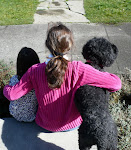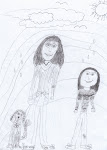Her lower jaw was crowded, her teeth so tightly packed, nothing could move. She’d just turned nine but only her two, top teeth had come out willingly, of their own accord. Her four middle, bottom, baby teeth had been pulled last summer to ease the crowding. Two adult teeth had come in, taking the place of the four. A third squeezed in sideways. The fourth, with no place to go, grew in behind the other three, creating a second row. My daughter’s reaction?
Look mom! Shark teeth!
Yeah… I mumbled. Great...
Six months after the first set were pulled, we were back to see the dentist. My daughter and I were both wary. The dentist had used a local anesthetic last summer. But the roots proved so long, so deep, the anesthetic so… local, my daughter had felt a great deal more than she should have. It shook me, my daughter, and even the dentist. Since then, no other baby teeth had loosened or budged. We were guessing – dreading – the news.
Looking at the X-rays, the dentist confirmed it. More teeth would have to be pulled.
Four? I guessed, wincing.
Uhh… no, she replied. Six. She looked pained.
Six? I repeated, incredulous.
She was as concerned as I. She looked back at the X-ray again, then leaned in close.
Oh… look here! The dentist exclaimed. She has a little extra tooth.. right up here.. in the gum… behind her two front teeth. See?
Huh? I leaned in to look and thought, Oh my God… what’s that? A fang?
My daughter walked up and the dentist turned to show her. Look! So sweet! The woman was practically cooing. It’s the cutest thing. You’ve got a little fairy tooth!

My daughter looked unsure, but took her cue from the dentist. Whoa… cool…
I said nothing but thought, A what? A FAIRY tooth? This woman is a genius. A pure genius.
After consultations with the orthodontist and oral surgeon, I was thanking the gods for that magical, little fairy tooth. Removing it required general anesthesia. The surgeon could extract the fairy tooth along with six other baby teeth -- all while my daughter slept.
This past Monday was D-Day. Surgery day.
My friend Cathy arrived early in the morning to help. The instructions in the pre-op pamphlet suggested two adults, one to drive, one to hold the patient.
My daughter was calm, even cheerful. Except for the occasional protest: I’m hungry! And: Seven teeth. Can you believe it, Cathy? Seven! Sheesh! -- slapping her forehead for added effect. She was a little nervous, but she also knew she’d be asleep, she wouldn’t feel or remember a thing, and there was ice cream -- lots of it -- in her future.
On the drive over, Cathy, focusing on the positive, suggested brightly: You’ll probably get a great, big bonus from the tooth fairy.
I froze. Gack! I had ice cream, jello, pudding, yoghurt, blankets, pillows, and meds at the ready. Crap! I’d forgotten about the tooth fairy.
My daughter came to the rescue. Oh, Cathy, she said almost disdainfully. There’s no tooth fairy. It’s my mom. I know that. There’s no Santa either. It’s all my mom.
I felt a touch of relief. But, she sounded so jaded, it took me aback. I grew nostalgic. Oh honey... Do you remember the feather fairy?
Oh yeah! That was so great. But -- that was you too Mom.
Yeah… I know…
The feather fairy? Cathy asked.
I relayed the story…
My daughter was four when she and her best buddy Ben were playing at his house in the yard and they found two bird feathers. When I came to pick up my daughter, she greeted me, jumping up and down, waving her feather.
Mommy! Look! I found a bird feather. It’s so pretty. Look!
It’s lovely honey.
Ben says if you stick it under your pillow, the feather fairy will come. And bring you a present! I’m going to stick it under my pillow. Do you think the feather fairy will really come?
Oh… I don’t know about that honey…
I was swearing under my breath: Damn! I loved Ben’s mom but she was a cross between June Cleaver and Martha Stewart. She always had some craft project, a creative gift, or toy for the kids. I really didn’t want to get sucked in this time.
Oh I hope the feather fairy comes, Mom! I really hope she comes.
My daughter talked of nothing else the rest of the evening and I realized this was one of those times I had to deliver. So I tucked her in bed after she oh-so-carefully laid her little brown, frayed feather flat under her pillow. I kissed her goodnight, pulled the door closed, and raced downstairs. Rummaging and digging about the storage closet, I found a small, chocolate brown dog with a red, plaid ribbon. I’d bought it and buried it for a special occasion. Score! But… how to make clear this was a special, one-time treat? I didn’t want my child collecting these filthy things, de-nuding every dead bird in our neighborhood.
I pulled out a blank piece of paper and picked up a fuschia colored marker. I drew swirly shapes and dotted the page with pink fairy dust. In big looping, curlicue script, I wrote:
Dear _______,
Congratulations on finding your very first feather! You are a clever girl. Your first feather is magical and special. Always remember it. And, the next time you find a feather, make a wish, think of the feather fairy -- and release it to the wind.
With love,
The Feather Fairy
The next morning my daughter burst into my room. She showed me the note and the little brown dog, hugging him tight. Mom! The feather fairy came! She came!
We read the note together.
She knows my name! How did she know my name?! And she signed it “with love!” She paused, filled with wonder. Mom! The feather fairy loves me.
Yes, she does honey. She sure does.
Turned out, the feather fairy was all Ben’s idea. Ben’s mother asked me, How could you? So the joke was on me. But, seeing my daughter’s joy made it all worth it.

When the nurse came to take me back to the recovery area, I saw my daughter lying on her side on a soft vinyl mat and pillow. Her legs stretched out beyond the flannel baby blue blanket I’d brought. Her head was cocked strangely back while her mouth was stuffed with bloodied rolls of gauze. She looked so big and yet -- she reminded me of a baby bird, the kind you find on the ground that’s fallen too soon from the nest.
It’s to keep her airways open, the nurse replied.
I sat down beside my daughter and touched her arm lightly. She woke slowly, limp, confused, completely disoriented. Cathy and the nurse helped me wheel her out to the car. She lay in my arms in a stupor while Cathy drove us home. I struggled to lift my daughter up and out of the car and realized I was nearing my limit. She’s 64 pounds now, and three quarters my height. But I managed to carry her into the house and lay her down in bed.
The rest of the day was calm and peaceful. She slept off the drugs, watched movies, ate bowl after bowl of ice cream, and checked out her new jack-o-lantern grin. Her two front teeth seemed to float out alone in the empty space of her mouth.

Look mom! she smiled. I’m a bucky-toothed beaver! We laughed.
After dinner, she went upstairs to get ready for bed. As I cleaned up the last of the dishes and wiped down the counters, I spotted the little white plastic case I’d thrown on the sill that morning. I peeked inside.
Her teeth lay like fallen soldiers. The surgeon had washed and saved all seven and I noticed the roots: long and intact. I found the little fairy tooth. It was clean, round, and pearly, almost pretty.
I closed up the case and went to join my daughter. Bathed, scrubbed, and brushed, she was reading quietly in bed. I flopped down on my belly to join her.
How’re the gums?
They’re okay. I’m okay.
Good. Pause. Hey… did it bother you I told Cathy about the feather fairy?
Oh no, Mom. It’s fine.
Okay. But… do me a favor?
What’s that Mom?
Well, I know you don’t believe in fairies, or Santa, any more. But …promise me something.
What, Mom?
Don’t give up on the magic. Not just yet. There’s still lots of magic to come.
Okay, Mom. Pause. Is that it?
Yeah…
She turned and went back to her book.



















 That had to hurt, I say. Pause. You know… Its okay to be sad.
That had to hurt, I say. Pause. You know… Its okay to be sad.

